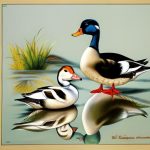Domestic duck breeds have been a part of human civilization for thousands of years, providing a source of meat, eggs, and feathers. Ducks are also kept as pets and for ornamental purposes due to their charming and often colorful plumage. There are numerous domestic duck breeds, each with its own unique characteristics and traits. These breeds have been selectively bred over generations to exhibit specific traits such as size, color, and egg-laying ability. In the United States, domestic duck breeds are popular among small-scale farmers, homesteaders, and backyard enthusiasts who appreciate their versatility and low-maintenance nature. Whether you are interested in raising ducks for meat, eggs, or simply as pets, there is a domestic duck breed that will suit your needs.
Table of Contents
- 1 Popular Domestic Duck Breeds in the United States
- 2 Characteristics and Traits of Different Domestic Duck Breeds
- 3 Choosing the Right Domestic Duck Breed for Your Needs
- 4 Caring for Domestic Duck Breeds: Housing, Feeding, and Health
- 5 Breeding and Raising Domestic Duck Breeds
- 6 The Diversity and Beauty of Domestic Duck Breeds
- 7 FAQs
- 7.1 What are domestic duck breeds?
- 7.2 How many domestic duck breeds are there in the US?
- 7.3 What are some popular domestic duck breeds in the US?
- 7.4 What are the differences between domestic duck breeds?
- 7.5 What are some considerations for choosing a domestic duck breed?
- 7.6 Are domestic duck breeds good for beginners?
- 7.7 What are some common health issues in domestic duck breeds?
Key Takeaways
- Domestic duck breeds come in a wide variety of sizes, colors, and characteristics, making them a popular choice for backyard poultry enthusiasts.
- Popular domestic duck breeds in the United States include the Pekin, Mallard, Rouen, and Khaki Campbell, each with its own unique traits and qualities.
- Different domestic duck breeds have varying characteristics and traits, such as egg production, foraging ability, and temperament, which should be considered when choosing the right breed for your needs.
- When choosing the right domestic duck breed for your needs, factors such as space, climate, and intended use (egg production, meat, or ornamental) should be taken into consideration.
- Caring for domestic duck breeds involves providing proper housing, feeding, and healthcare to ensure their well-being and longevity, making them a rewarding addition to any backyard or farm.
Popular Domestic Duck Breeds in the United States
In the United States, several domestic duck breeds are particularly popular among farmers and backyard enthusiasts. The Pekin duck is one of the most common domestic duck breeds in the country. Known for its large size, white plumage, and excellent meat production, the Pekin duck is a favorite among those who raise ducks for meat. Another popular domestic duck breed is the Khaki Campbell, prized for its high egg production and calm disposition. Muscovy ducks are also popular for their unique appearance and ability to forage for food. Other popular domestic duck breeds in the United States include the Rouen, Swedish, and Indian Runner ducks, each valued for their distinct characteristics and traits.
Characteristics and Traits of Different Domestic Duck Breeds
Domestic duck breeds come in a wide variety of sizes, shapes, and colors, each with its own unique characteristics and traits. The Pekin duck, for example, is a large, heavy-bodied breed with pure white plumage and orange bills and feet. Pekin ducks are known for their rapid growth and excellent meat production, making them a popular choice for meat production. In contrast, the Khaki Campbell is a medium-sized breed with a khaki-colored plumage and a reputation for being one of the best egg-laying breeds. Muscovy ducks are easily recognized by their distinctive red facial caruncles and black plumage with white wing patches. They are known for their ability to fly and their excellent foraging skills. The Rouen duck is a large, heavy breed with stunning iridescent green heads and rich brown plumage. Swedish ducks come in a variety of colors including blue, black, and splash, and are known for their calm temperament and good egg production. Indian Runner ducks are slender and upright with a unique walking gait, making them excellent foragers.
Choosing the Right Domestic Duck Breed for Your Needs
When choosing a domestic duck breed, it’s important to consider your specific needs and goals. If you are primarily interested in meat production, the Pekin duck is an excellent choice due to its rapid growth and large size. For those interested in egg production, the Khaki Campbell is a top contender, known for its exceptional egg-laying abilities. If you are looking for a breed that is both ornamental and practical, the Rouen duck’s stunning plumage and good meat production make it an attractive option. Muscovy ducks are a great choice for those who want a breed that can forage for food and provide both meat and eggs. Swedish ducks are known for their calm temperament and good egg production, making them a versatile choice for small-scale farmers and homesteaders. Indian Runner ducks are ideal for those who want a breed that excels at foraging and has a unique appearance.
Caring for Domestic Duck Breeds: Housing, Feeding, and Health
Caring for domestic duck breeds involves providing them with appropriate housing, feeding them a balanced diet, and ensuring their overall health and well-being. Ducks require access to clean water for drinking and bathing, as well as shelter from predators and the elements. Housing should provide adequate space for the ducks to move around comfortably and protection from extreme temperatures. Ducks should be fed a diet that includes commercial duck feed or a balanced mix of grains, greens, and protein sources such as insects or mealworms. It’s important to monitor the ducks’ health regularly and provide veterinary care as needed to prevent and treat common ailments such as respiratory infections or parasites. Additionally, ducks should be provided with opportunities for exercise and mental stimulation to ensure their overall welfare.
Breeding and Raising Domestic Duck Breeds

Breeding domestic duck breeds can be a rewarding endeavor for those interested in expanding their flock or producing ducklings for sale. To successfully breed ducks, it’s important to provide them with appropriate nesting areas and ensure that they have access to clean water and a nutritious diet. Ducks typically lay their eggs in secluded areas such as nesting boxes or shelters with bedding material. Once the eggs are laid, they should be collected daily to prevent them from being damaged or eaten by predators. Incubating duck eggs can be done using an incubator or by allowing broody hens or ducks to sit on the eggs until they hatch. Raising ducklings involves providing them with warmth, protection from predators, and a balanced diet to support their growth and development. Ducklings should be kept in a warm brooder until they are old enough to regulate their body temperature and then gradually introduced to outdoor living.
The Diversity and Beauty of Domestic Duck Breeds
In conclusion, domestic duck breeds offer a diverse array of options for those interested in raising ducks for meat, eggs, or ornamental purposes. Each breed has its own unique characteristics and traits that make it well-suited for specific purposes. Whether you are drawn to the large size and meat production of the Pekin duck, the exceptional egg-laying abilities of the Khaki Campbell, or the stunning plumage of the Rouen duck, there is a domestic duck breed that will meet your needs. Caring for domestic duck breeds involves providing appropriate housing, feeding, and healthcare to ensure their overall well-being. Breeding and raising domestic duck breeds can be a rewarding experience that allows you to expand your flock or produce ducklings for sale. The diversity and beauty of domestic duck breeds make them a valuable addition to small-scale farms, homesteads, and backyard settings.
If you’re considering raising domestic duck breeds, you may also be interested in learning about the best practices for keeping chickens. Poultry Wizard offers a helpful article on “How to Choose the Right Heater for a Chicken Coop” that provides valuable insights into ensuring the comfort and well-being of your feathered friends. Check out the article here to discover essential tips for maintaining a cozy and safe environment for your chickens.
FAQs
What are domestic duck breeds?
Domestic duck breeds are breeds of ducks that have been selectively bred by humans for specific traits such as egg production, meat quality, or ornamental purposes.
How many domestic duck breeds are there in the US?
There are over 30 recognized domestic duck breeds in the US, each with its own unique characteristics and purposes.
What are some popular domestic duck breeds in the US?
Some popular domestic duck breeds in the US include the Pekin, Mallard, Rouen, Khaki Campbell, and Muscovy.
What are the differences between domestic duck breeds?
Domestic duck breeds differ in size, coloration, egg production, meat quality, and temperament. Some breeds are better suited for egg production, while others are bred for meat or ornamental purposes.
What are some considerations for choosing a domestic duck breed?
When choosing a domestic duck breed, it’s important to consider factors such as the breed’s purpose (egg production, meat, ornamental), space requirements, climate adaptability, and temperament.
Are domestic duck breeds good for beginners?
Some domestic duck breeds are better suited for beginners than others. Breeds such as the Pekin and Khaki Campbell are known for being docile and easy to care for, making them good choices for beginners.
What are some common health issues in domestic duck breeds?
Common health issues in domestic duck breeds include respiratory infections, bumblefoot, and egg binding. It’s important to provide proper housing, nutrition, and veterinary care to prevent and address these health issues.
Meet Walter, the feathered-friend fanatic of Florida! Nestled in the sunshine state, Walter struts through life with his feathered companions, clucking his way to happiness. With a coop that’s fancier than a five-star hotel, he’s the Don Juan of the chicken world. When he’s not teaching his hens to do the cha-cha, you’ll find him in a heated debate with his prized rooster, Sir Clucks-a-Lot. Walter’s poultry passion is no yolk; he’s the sunny-side-up guy you never knew you needed in your flock of friends!







